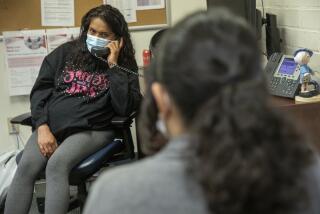Out of Reach Abroad, Ineligible Patients’ Assets Can Be Hard to Trace
A Taiwanese businesswoman received a heart bypass operation at Garfield Medical Center in Monterey Park, and taxpayers were going to foot thousands of dollars in bills--until hospital officials embarked on an international search for the woman’s assets.
A private investigator found that the woman had bank accounts, real estate and two companies worth millions of dollars.
The case is an extreme example, but Medi-Cal officials say it illustrates the ease with which ineligible foreign patients can qualify for public medical assistance, even when they have assets in their home countries.
Medi-Cal workers routinely check tax and bank records to verify that citizens qualify for medical assistance. But because it is extremely difficult to search for assets in other countries, some well-off foreign patients have been able to slip into publicly financed programs for poor residents of California.
State officials say they do not know how many are doing so, although they believe that the drain on publicly financed programs is substantial.
The patient at Garfield was neither an illegal immigrant nor a legal foreign visitor--two groups of foreign patients that state officials say have placed a tremendous burden on publicly financed health programs. She fell into a third category: a legal immigrant permanently residing in California.
The woman’s son brought her to Garfield Medical Center when she started having chest pains, said Tom Chang, Garfield’s chief financial officer. At the time, the son was told what bypass surgery would cost and, Chang said, agreed to pay the bill.
But after the operation in the summer of 1991, the son refused to pay the hospital, saying his mother qualified for Medi-Cal, the tax-financed health insurance program for the poor.
Hospital officials were astonished because they knew that the woman had extensive business ties to Asia. Chang said her passport showed 36 round trips to Asian destinations over five years.
Hospital officials also knew that they would lose money on the case because Medi-Cal would not cover all of Garfield’s costs.
So Chang, using his contacts in Taiwan, hired a private investigator there who found businesses and other assets belonging to the woman, whose name Chang would not disclose.
Chang turned the findings over to the Southern California Medi-Cal fraud unit headed by Larry Malm. With the evidence that the woman’s claims to poverty were false, Malm said Medi-Cal recently got the patient to reimburse $30,000 that the program paid to the hospital and its doctors.
Chang said Garfield Medical Center plans to sue the woman for $150,000 in costs not covered by Medi-Cal. But the hospital cannot afford to take such action in every case, nor can it always spot these abuses, he said.
“My aggravation is that the state and federal laws make it so easy for these people to get Medi-Cal,” Chang said. “It is not up to the hospital to investigate this.”
But Malm said Medi-Cal cannot afford the expense of tracking foreign assets either.
More to Read
Sign up for Essential California
The most important California stories and recommendations in your inbox every morning.
You may occasionally receive promotional content from the Los Angeles Times.










